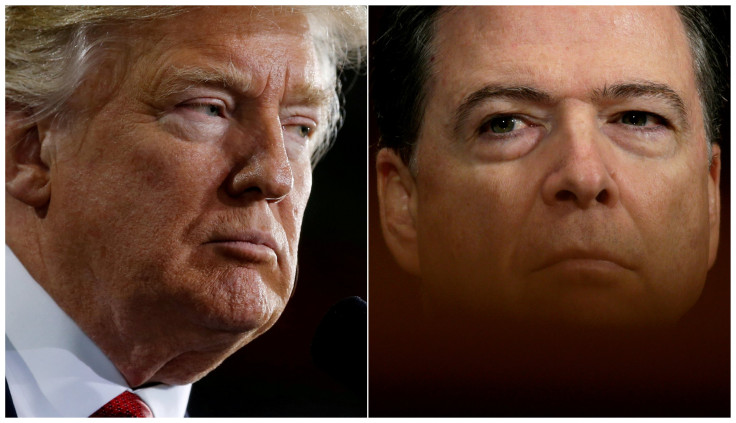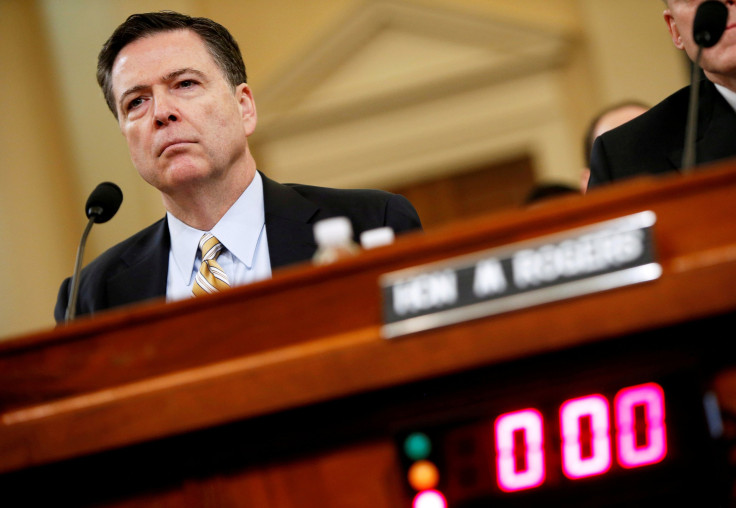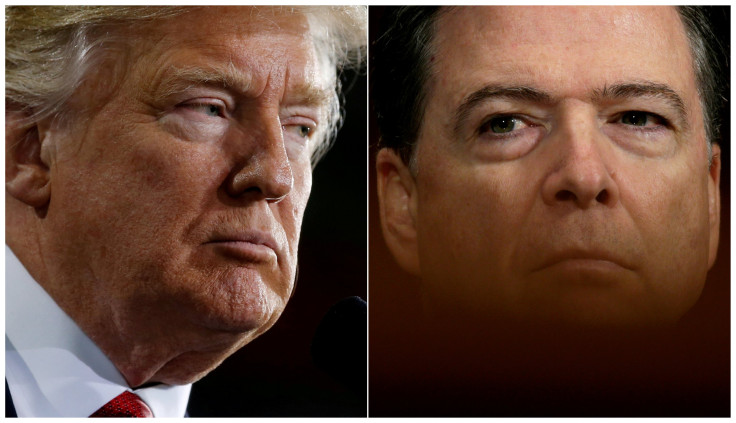What Happened With James Comey? Timeline Of Events That Led To FBI Director’s Firing

Former FBI Director James Comey was set to testify Thursday about the months-long controversy that involved everything from Hillary Clinton to Russia to the president’s comments about “loyalty.” Comey’s prepared testimony was released in a statement by the Senate Intelligence Committee Wednesday, revealing that Trump had asked him to “let go” of the investigation into former National Security Adviser Mike Flynn, who resigned after revealing he had misled officials about his conversations with Russia.
The lead-up to Comey’s testimony has been filled with controversy after controversy – but just how did the former FBI director get involved in such a tangled web?
Read: Full Text Of James Comey's Testimony Before Senate Intelligence Committee
Jun. 21, 2013: Former President Barack Obama formally nominated James Comey as the director of the Federal Bureau of Investigation. Comey replaced Robert S. Mueller III, who retired after 12 years of leading the FBI.
Aug. 4, 2015: Comey confirmed the FBI was looking into Hillary Clinton’s use of a private email server during her time as secretary of state.

Jul. 3, 2016: In a three and a half hour interview with the FBI, Clinton was questioned about her use of the private server. At the time, reports called it the “final step” in the investigation. “I’ve been eager to do it and I was pleased to have the opportunity to assist the department in bringing its review to a conclusion,” Clinton told reporters after the interview.
Jul. 5, 2016: In a formal announcement, Comey said he would not recommend Clinton be charged for her use of a private server. “Although we did not find clear evidence that Secretary Clinton or her colleagues intended to violate laws governing the handling of classified information, there is evidence that they were extremely careless in their handling of very sensitive, highly classified information,” Comey said in a statement.
Jul. 6, 2016: Attorney General Loretta Lynch said she accepted the FBI’s recommendation to not bring charges against Clinton.
Jul. 7, 2016: During a hearing before the House Oversight and Government Reform Committee, Comey’s decision to not recommend charging Clinton was questioned. “The FBI’s recommendation is surprising and confusing,” chairman Jason Chaffetz said at the time. “The fact pattern presented by Director Comey makes clear Secretary Clinton violated the law. Individuals who intentionally skirt the law must be held accountable. Congress and the American people have a right to understand the depth and breadth of the FBI’s investigation.
Sept. 7, 2016: Comey defended his decision in a statement released to his employees. “Those suggesting that we are ‘political’ or part of some ‘fix’ either don’t know us, or they are full of baloney (and maybe some of both),” he said. “[The decision] was not a cliffhanger; despite all the chest-beating by people no longer in the government, there really wasn’t a prosecutable case.”
Oct. 28, 2016: Just 11 days before the election, Comey announced the FBI would be investigating new emails in relation to Clinton. The emails were found on the laptop of Anthony Weiner, a former representative married to top Clinton Aide Huma Abedin.
Nov. 6, 2016: Comey announced that despite the new emails, the FBI said it would uphold its previous recommendation that Clinton not be charged.
Mar. 20, 2017: Two months into Trump’s term, Comey announced that the FBI was investigating possible collusion between the Trump campaign and Russian officials. “The FBI, as part of our counterintelligence mission, is investigating the Russian government’s efforts to interfere in the 2016 presidential election,” said Comey. “And that includes investigating the nature of any links between individuals associated with the Trump campaign and the Russian government and whether there was any coordination between the campaign and Russia’s efforts.”
May 9, 2017: Trump suddenly fired Comey. The administration said the president made his decision “based on the clear recommendations of both Deputy Attorney General Rod Rosenstein and Attorney General Jeff Sessions.” In a letter to Comey, Trump wrote: “While I greatly appreciate you informing me, on three separate occasions, that I am not under investigation, I nevertheless concur with the judgment of the Department of Justice that you are not able to effectively lead the bureau.”
May 10, 2017: Reports emerged that Trump told Russian officials during a meeting at the White House that Comey was “crazy, a real nut job.” “I faced great pressure because of Russia,” he reportedly told them, according to the New York Times. “That’s taken off.”
May 11, 2017: Trump called Comey a “showboat” and a “grandstander” in an interview with NBC News. He also confirmed that he was thinking about Russia when he fired Comey. “You know, this Russia thing with Trump and Russia is a made up story,” he said. “It’s an excuse by the Democrats for having lost an election that they should have won.”
May 16, 2017: Reports emerged that Trump asked Comey to stop investigating former National Security Adviser Michael Flynn. Comey reportedly kept detailed memos of the conversation in which Trump said, “I hope you can let this go.”
Jun. 5, 2017: The White House stated that it would not block Comey from testifying publicly before the Senate Intelligence Committee by utilizing executive privilege. “The president’s power to assert executive privilege is well established,” said spokesperson Sarah Huckabee Sanders. “However, in order to facilitate a swift and thorough examination of the facts sought by the Senate Intelligence Committee, Trump will not assert executive privilege regarding James Comey’s scheduled testimony.”
Read: Trump's Approval Rating Drops Again After Comey Firing
Jun. 6, 2017: When asked if he had a message for Comey in the days leading up to his testimony, Trump said, “I wish him luck.”
Jun. 7, 2017: The Senate Intelligence Committee released the prepared remarks Comey would make during his testimony in which he directly discussed his relationship with Trump, the Russian investigation and Mike Flynn.
Jun. 8, 2017: Comey was scheduled to testify before the Senate Intelligence Committee at 10 a.m. EST.

© Copyright IBTimes 2025. All rights reserved.






















